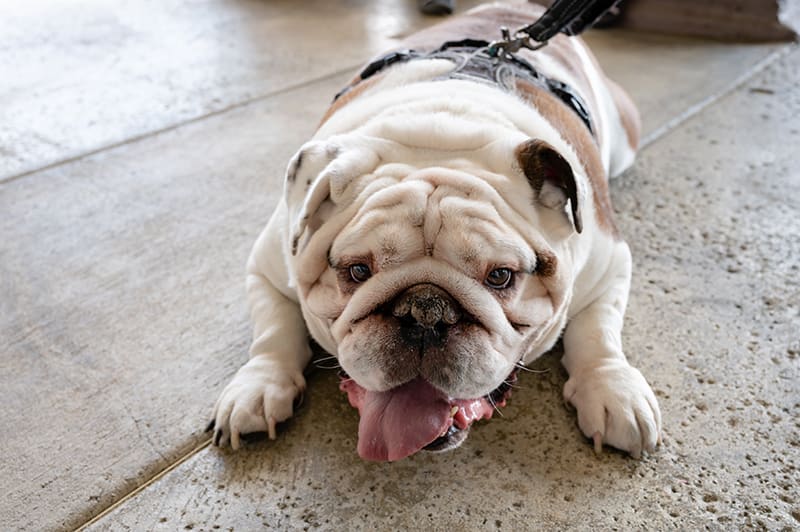Many pet parents wonder if their dog or cat's panting means that their pet is experiencing labored breathing. While this can be the case, labored breathing actually means that the pet is struggling to breathe. Our Bartlett vets and team share more about labored breathing in dogs and cats.
Labored Breathing VS Breathing Quickly
In order to be able to recognize when your dog or cat is having trouble breathing it's important to distinguish between breathing quickly (tachypnea) and actually struggling to breathe (dyspnea).
Tachypnea
- Tachypnea is the fast breathing we all experience when exercising. If you take your dog out for a run, they may pant and breathe quickly but this does not mean that your dog is having difficulties breathing.
Dyspnea
- Dyspnea is the term for labored breathing in cats and dogs. This term means that your animal is actually having difficulties taking breaths, or is short of breath.
If your pet is experiencing labored breathing is considered to be a veterinary emergency and requires immediate action, but how can you tell if your pet is struggling to breathe properly? When cats and dogs are experiencing breathing difficulties the symptoms they will exhibit may be different.
How To Spot Labored Breathing in Dogs
If your pooch is having difficulty breathing (labored breathing) you are likely to notice one or more of the following symptoms:
- Exercise intolerance (most notably, when you take them for a walk)
- Persistent cough, especially at night
- An increased respiratory rate > 40 bpm
- Stretching the neck out to breathe
- An unusually hoarse sounding bark
- Sighs of anxiety such as restlessness or pacing
- Constant panting
- Sitting up with a wide stance to breathe (front legs/elbows spread out)
- Belly heaving in and out more as they breathe
- Foaming or frothing at the mouth
- Blue-tinged gums
Signs of Labored Breathing in Cats
Cats will often hide when they aren't feeling well which can make spotting the signs of labored breathing challenging for cat parents. Nonetheless, when a cat is experiencing difficulties breathing they will typically exhibit one or more of the following symptoms:
- Hiding in a quiet place
- Increased respiratory rate
- Body hunched close to the ground with neck extended forward
- Hacking or persistent coughing
- Open-mouth breathing
- Blue-tinged gums
- Foaming or frothing from the mouth
What To Do If Your Dog or Cat Has Labored Breathing
If your dog or cat is displaying any signs of breathing difficulties it's time to head to the vet! Labored breathing should always be considered a veterinary emergency. In order to help your pet to breathe easier your vet will need to diagnose the underlying condition that is causing your pet's breathing issues.
Common Causes of Labored Breathing in Pets
Cats and dogs aren't always susceptible to the same conditions but some of the most common health issues that can lead to breathing difficulties in either type of animal include:
- Asthma
- Infectious diseases
- Growths in the upper airway
- Heart failure
- Cancer
- Metabolic issues
- Pneumonia
- Exposure to toxins
- Trauma
Treatment for Pets Struggling With Labored Breathing
After your pet has had a thorough examination the treatment prescribed by your veterinarian will depend upon the underlying cause of your pet's breathing difficulties. Some treatments for labored breathing include:
- Oxygen therapy
- IV fluids
- Steroids to reduce airway inflammation
- Bronchodilators to expand airway and increase airflow
- Diuretics to treat fluid in lungs
Additional diagnostic testing may be required in order to pinpoint the precise cause of your pet's breathing difficulties. Diagnostic testing could include chest or abdominal x-rays and electrocardiogram or echocardiogram to check heart function.
Note: The advice provided in this post is intended for informational purposes and does not constitute medical advice regarding pets. For an accurate diagnosis of your pet's condition, please make an appointment with your vet.
If you think that your dog or cat is struggling to breathe properly it's time to head to the vet! Contact our Bartlett vets right away or visit your nearest animal emergency clinic to recieve urgent care for your pet.

Looking for a vet in Memphis?
We're always accepting new patients, so contact our veterinary hospital today to book your pet's first appointment.Related Articles View All
Heimlich Maneuver For Dogs: What To Do If My Dog Is Choking
What should you do if something gets lodged in your dog's throat and they begin to choke? Here, you will find helpful information on the Heimlich maneuver for dogs and what to do if your dog is choking.
Signs That Your Dog May Have a Cavity
Can dogs get cavities? What are the signs of cavities in dogs? In today's post, you will find the answers to these dog cavity questions and more.
Chipped Tooth in Dogs - What to Do if Your Dog Has a Broken Tooth
Dogs often experience chipped or fractured teeth. Is a broken dog tooth an emergency? It might be. Today's post contains information about broken teeth in dogs and what to do about dog tooth fractures.
Large Dog Care & Saving Money with Wellness Plans
What do large and giant breed dogs need to stay healthy and happy? Here, we provide vital information on how to proactively care for your giant or large dog's health and save money along the way.
